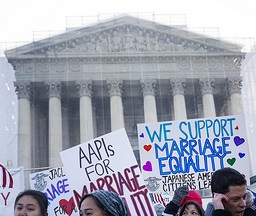“Gay Marriage? Same-Sex Marriage? Marriage Equality?” Examining the Media’s Language on LGBTQ Issues

AHA Advocacy Intern Mallory Kruper attended a recent panel discussion hosted by the ACLU on how the media’s reporting on LGBTQ rights, particularly related to the issue of marriage, changed with the culture.
On June 12, the American Civil Liberties Union (ACLU) and Colombia Journalism Review sponsored a panel discussion at the Newseum in Washington, DC, called “We Now Pronounce You…? Covering Gay Marriage in the New American Landscape” to discuss marriage equality, how the issue has evolved over time, and the role of the media’s coverage of this issue. This discussion was moderated by Jennifer Vanasco, the Minority Reports columnist for the Columbia Journalism Review, and featured four panelists: David Fontana, associate professor of law at George Washington University, Chris Geidner, senior political and legal reporter at Buzzfeed, E.J. Graff, columnist at The American Prospect and author of What is Marriage For?, and Steven Petrow, columnist for The New York Times and former president of the National Lesbian & Gay Journalists Association.
The event began with a brief discussion about the two cases being reviewed by the Supreme Court, United States vs. Windsor, which challenges Section 3 of the Defense of Marriage Act (DOMA) which defines marriage as “a legal union between one man and one woman,” and Hollingsworth vs. Perry, which challenges California Proposition 8, a state amendment that eliminate the rights of same-sex couples to marry. The panelists noted how the media has been frequently trying to predict the outcome, and that while it may be interesting to discuss, it is never really possible to predict what will happen. Fontana noted that you can only know the different ways it may turn out when the Court makes a decision but not which one it will be.
The discussion then transitioned into a look at what language the media uses to cover the issue of gay marriage and what language they should be using. Petrow mentioned that one area where journalists have really failed is language. “Gay marriage” became the term to use because it is short and has been used by the media and now “gay marriage” receives three times more hits on Google than “same-sex marriage,” so the media continues to use it.
Graff brought up that we should not say gay marriage because this makes people think only of gay men; in reality, of same-sex couples, women marry twice as often as men. People used to say same-sex marriage more often, but lawyers did not like this term because it made the union sound completely separate from regular marriage. The term “marriage equality” is good but not very descriptive. The one term we should avoid for opposite-sex marriage is “traditional marriage” because the idea of a traditional marriage has changed drastically over time and very few current marriages fit the definition of how we perceive a traditional marriage, that being the stereotypical 1950s marriage. But even marriage in the 1950s was a dramatic change from the marriage even a century before. She ended by laughing, “There’s no good language.”
The panelists also discussed how media coverage has changed, as well as whether this coverage is fair, too liberal, or too conservative. Graff references the early 2000s when Massachusetts went through the process of legalizing same-sex marriages, and how each time there was a movement toward marriage equality, there would be a backlash followed by a period of movement of “who cares what they do” until all of a sudden everyone got comfortable with the idea and stopped caring about what happens in Massachusetts. Fontana pointed out how the change of moral language by supporters to using the term “marriage equality” has changed the way people present the issue. He also noted that the majority of the public is much more supportive of the issue that political figures and people believe that there will inevitably be gay marriage.
Geidner brought up how media coverage has changed because “the ability to cover the issue changes as the country changes” and some journalists even seem embarrassed by how they covered the issue in the past. While there has been a evident change in the how the country sees this issue, Graff pointed out that it is still important to be able to understand the reasons why people may be against gay marriage and have trouble seeing it as a civil right, but that there is a complete lack of understanding for this in the Northeast.
The discussion ended with an opportunity for the audience to ask questions, and because the event was streamed live through CJR, those watching it online were able to ask questions through Twitter. Overall this panel discussion showed how the issue of gay marriage has evolved in the past several decades and how the media coverage has become increasingly more supportive of the issue as the country becomes more supportive.
